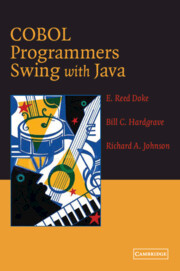Book contents
- Frontmatter
- Contents
- Preface
- Introduction
- Chapter 1 Why You Should Learn Java
- Chapter 2 An Introduction to Object-Oriented Programming
- Chapter 3 Java Structure
- Chapter 4 Defining Data
- Chapter 5 Computation
- Chapter 6 Decision Making
- Chapter 7 Loops
- Chapter 8 Arrays
- Chapter 9 Data Access
- Chapter 10 Graphical User Interfaces
- Chapter 11 Object-Oriented Development Issues
- Glossary
- Index
Chapter 11 - Object-Oriented Development Issues
Published online by Cambridge University Press: 26 August 2009
- Frontmatter
- Contents
- Preface
- Introduction
- Chapter 1 Why You Should Learn Java
- Chapter 2 An Introduction to Object-Oriented Programming
- Chapter 3 Java Structure
- Chapter 4 Defining Data
- Chapter 5 Computation
- Chapter 6 Decision Making
- Chapter 7 Loops
- Chapter 8 Arrays
- Chapter 9 Data Access
- Chapter 10 Graphical User Interfaces
- Chapter 11 Object-Oriented Development Issues
- Glossary
- Index
Summary
OBJECTIVES
In this chapter you will study:
OO development;
OO analysis and design issues; and
Technology architecture issues.
This chapter provides an overview of OO development and some of the issues you should consider when developing OO systems. Whereas the previous chapters introduced specific programming topics, this chapter will pull together several of those topics and present them in terms of software development. As you will see, OO development is much more than writing Java programs. The successful software developer must become familiar with, and apply, OO development techniques. OO requires more attention to analysis and design than traditional development; however, the payoff is software that is developed quicker and is easier to maintain. The chapter begins with an overview of OO development followed by a brief introduction to current OO systems development methodologies. Next, activities commonly associated with analysis are presented. Then, various aspects of design necessary for understanding OO development and successful Java programming are discussed. Java examples are provided to enable you to compare and contrast some of the basic philosophical differences between OO and traditional development approaches.
This chapter assumes you understand the following:
Java:
OO concepts (Chapter 2)
Java program structure (Chapter 3)
Defining data (Chapter 4)
Arithmetic (Chapter 5)
Decision making (Chapter 6)
Looping (Chapter 7)
Arrays (Chapter 8)
Data access (Chapter 9)
Graphical User Interfaces (Chapter 10)
DEVELOPING OBJECT-ORIENTED SYSTEMS
Programming is not a stand-alone process, although that has been the focus so far in this book.
- Type
- Chapter
- Information
- COBOL Programmers Swing with Java , pp. 229 - 250Publisher: Cambridge University PressPrint publication year: 2004



